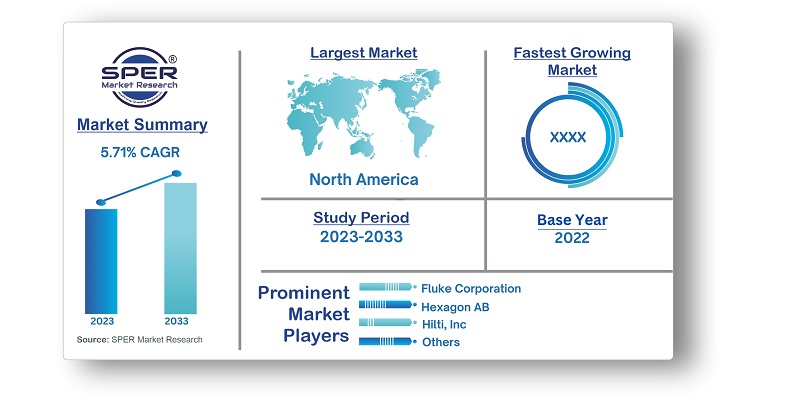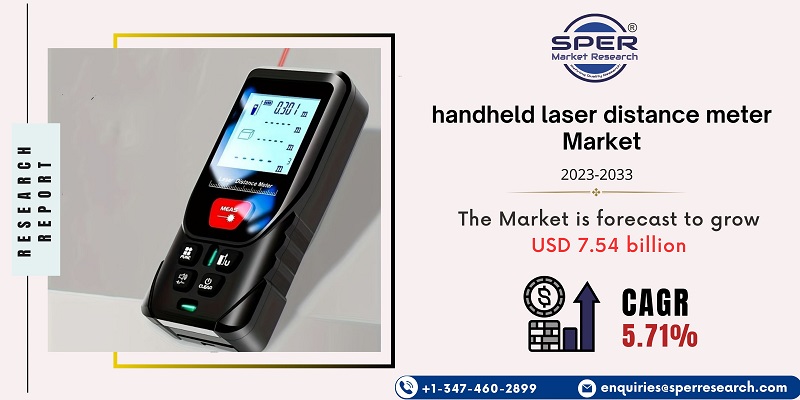
Laser Distance Meter Market Growth, Trends, Size, Demand, Revenue, Share and Future Outlook
Handheld Laser Distance Meter Market Size- By Range, By Category, By End Use, By Application, By Distribution Channel- Regional Outlook, Competitive Strategies and Segment Forecast to 2033
| Published: Feb-2023 | Report ID: IACT2316 | Pages: 1 - 236 | Formats*: |
| Category : Information & Communications Technology | |||
- February 2019: In order to purchase refurbished or pre-owned, legacy Trimble products, customers in the United States can connect directly with Trimble's SITECH® dealer network through the company's e-Commerce platform, Trimble Exchange, which was announced in February 2019 by the California-based manufacturer of laser rangefinders and inertial navigation systems. Trimble hopes to draw clients with the introduction of the new e-commerce platform, particularly from the civil construction sector, by providing affordable rates on used Trimble machinery.
- On June 25, 2023: A well-known producer of laser measurement tools, Mileseey, introduced the DP20 Pro Bilateral Laser Distance Metre. This gadget transforms the field of distance measurement by simultaneously emitting laser beams in opposite directions, doing away with the requirement to look for walls or other barriers for the beams to bounce off of.


| Report Metric | Details |
| Market size available for years | 2019-2033 |
| Base year considered | 2022 |
| Forecast period | 2023-2033 |
| Segments covered | By Range, By Category, By End Use, By Application, By Distribution Channel |
| Regions covered | North America, Asia-Pacific, Latin America, Middle East & Africa and Europe |
| Companies Covered | Fluke Corporation, Hexagon AB, Hilti, Inc., Makita U.S.A., Inc., Nikon Corporation, Precaster Enterprises Co., Ltd., Prexiso AG, Robert Bosch GmbH, STABILA Measuring Instruments Gustav Ullrich GmbH, Stanley Black & Decker Inc., Trimble, Inc., Others |
- Construction Industry Professionals
- Real Estate Professionals
- Interior Designers and Decorators
- Surveying and Land Measurement Services
- DIY Enthusiasts and Homeowners
- Industrial and Manufacturing Sectors
- Architects and Engineers
- Forestry and Environmental Sciences
- Emergency Services and Search and Rescue Teams
- Geologists and Mining Professionals
- Retailers and E-commerce Platforms
- Others
| By Range: |
|
| By Category: |
|
| By End Use: |
|
| By Application: |
|
| By Distribution Channel: |
|
- Global Handheld Laser Distance Meter Market Size (FY’2023-FY’2033)
- Overview of Global Handheld Laser Distance Meter Market
- Segmentation of Global Handheld Laser Distance Meter Market By Range (Up to 30 Meters, 30 to 100 Meters, Above 100 Meters)
- Segmentation of Global Handheld Laser Distance Meter Market By Category (With Bluetooth, Without Bluetooth)
- Segmentation of Global Handheld Laser Distance Meter Market By End Use (Building and Construction, Logistics, Metal and Mining, Military)
- Segmentation of Global Handheld Laser Distance Meter Market By Application (Distance Measurement, Level and Elevator Measuring, Position and Monitoring Objects, Security Applications Movement Detection)
- Segmentation of Global Handheld Laser Distance Meter Market By Distribution Channel (Direct Sales, Indirect Sales)
- Statistical Snap of Global Handheld Laser Distance Meter Market
- Expansion Analysis of Global Handheld Laser Distance Meter Market
- Problems and Obstacles in Global Handheld Laser Distance Meter Market
- Competitive Landscape in the Global Handheld Laser Distance Meter Market
- Impact of COVID-19 and Demonetization on Global Handheld Laser Distance Meter Market
- Details on Current Investment in Global Handheld Laser Distance Meter Market
- Competitive Analysis of Global Handheld Laser Distance Meter Market
- Prominent Players in the Global Handheld Laser Distance Meter Market
- SWOT Analysis of Global Handheld Laser Distance Meter Market
- Global Handheld Laser Distance Meter Market Future Outlook and Projections (FY’2023-FY’2033)
- Recommendations from Analyst
1.1. Scope of the report1.2. Market segment analysis
2.1. Research data source2.1.1. Secondary Data2.1.2. Primary Data2.1.3. SPER’s internal database2.1.4. Premium insight from KOL’s2.2. Market size estimation2.2.1. Top-down and Bottom-up approach2.3. Data triangulation
4.1. Driver, Restraint, Opportunity and Challenges analysis4.1.1. Drivers4.1.2. Restraints4.1.3. Opportunities4.1.4. Challenges4.2. COVID-19 Impacts of the Global Handheld Laser Distance Meter Market
5.1. SWOT Analysis5.1.1. Strengths5.1.2. Weaknesses5.1.3. Opportunities5.1.4. Threats5.2. PESTEL Analysis5.2.1. Political Landscape5.2.2. Economic Landscape5.2.3. Social Landscape5.2.4. Technological Landscape5.2.5. Environmental Landscape5.2.6. Legal Landscape5.3. PORTER’s Five Forces5.3.1. Bargaining power of suppliers5.3.2. Bargaining power of buyers5.3.3. Threat of Substitute5.3.4. Threat of new entrant5.3.5. Competitive rivalry5.4. Heat Map Analysis
6.1. Global Handheld Laser Distance Meter Market Manufacturing Base Distribution, Sales Area, Product Type6.2. Mergers & Acquisitions, Partnerships, Product Launch, and Collaboration in Global Handheld Laser Distance Meter Market
7.1. Global Handheld Laser Distance Meter Market Value Share and Forecast, By Range, 2023-20337.2. Up to 30 Meters7.3. 30 to 100 Meters7.4. Above 100 Meters
8.1. Global Handheld Laser Distance Meter Market Value Share and Forecast, By Category, 2023-20338.2. With Bluetooth8.3. Without Bluetooth
9.1. Global Handheld Laser Distance Meter Market Value Share and Forecast, By End Use, 2023-20339.2. Building and Construction9.3. Logistics9.4. Metal and Mining9.5. Military
10.1. Global Handheld Laser Distance Meter Market Value Share and Forecast, By Application, 2023-203310.2. Distance Measurement10.3. Level and Elevator Measuring10.4. Position and Monitoring Objects10.5. Security Applications Movement Detection
11.1. Global Handheld Laser Distance Meter Market Value Share and Forecast, By Distribution Channel, 2023-203311.2. Direct Sales11.3. Indirect Sales
12.1. Global Handheld Laser Distance Meter Market Size and Market Share
13.1. Global Handheld Laser Distance Meter Market Size and Market Share By Range (2019-2026)13.2. Global Handheld Laser Distance Meter Market Size and Market Share By Range (2027-2033)
14.1. Global Handheld Laser Distance Meter Market Size and Market Share By Category (2019-2026)14.2. Global Handheld Laser Distance Meter Market Size and Market Share By Category (2027-2033)
15.1. Global Handheld Laser Distance Meter Market Size and Market Share By End Use (2019-2026)15.2. Global Handheld Laser Distance Meter Market Size and Market Share By End Use (2027-2033)
16.1. Global Handheld Laser Distance Meter Market Size and Market Share By Application (2019-2026)16.2. Global Handheld Laser Distance Meter Market Size and Market Share By Application (2027-2033)
17.1. Global Handheld Laser Distance Meter Market Size and Market Share By Distribution Channel (2019-2026)17.2. Global Handheld Laser Distance Meter Market Size and Market Share By Distribution Channel (2027-2033)
18.2. Global Handheld Laser Distance Meter Market Size and Market Share By Region (2027-2033)18.1. Global Handheld Laser Distance Meter Market Size and Market Share By Region (2019-2026)18.3. Asia-Pacific18.3.1. Australia18.3.2. China18.3.3. India18.3.4. Japan18.3.5. South Korea18.3.6. Rest of Asia-Pacific18.4. Europe18.4.1. France18.4.2. Germany18.4.3. Italy18.4.4. Spain18.4.5. United Kingdom18.4.6. Rest of Europe18.5. Middle East and Africa18.5.1. Kingdom of Saudi Arabia18.5.2. United Arab Emirates18.5.3. Rest of Middle East & Africa18.6. North America18.6.1. Canada18.6.2. Mexico18.6.3. United States18.7. Latin America18.7.1. Argentina18.7.2. Brazil18.7.3. Rest of Latin America
19.1. Fluke Corporation19.1.1. Company details19.1.2. Financial outlook19.1.3. Product summary19.1.4. Recent developments19.2. Hexagon AB19.2.1. Company details19.2.2. Financial outlook19.2.3. Product summary19.2.4. Recent developments19.3. Hilti, Inc.19.3.1. Company details19.3.2. Financial outlook19.3.3. Product summary19.3.4. Recent developments19.4. Makita U.S.A., Inc.19.4.1. Company details19.4.2. Financial outlook19.4.3. Product summary19.4.4. Recent developments19.5. Precaster Enterprises Co., Ltd.19.5.1. Company details19.5.2. Financial outlook19.5.3. Product summary19.5.4. Recent developments19.6. Prexiso AG19.6.1. Company details19.6.2. Financial outlook19.6.3. Product summary19.6.4. Recent developments19.7. Robert Bosch GmbH19.7.1. Company details19.7.2. Financial outlook19.7.3. Product summary19.7.4. Recent developments19.8. STABILA Measuring Instruments Gustav Ullrich GmbH19.8.1. Company details19.8.2. Financial outlook19.8.3. Product summary19.8.4. Recent developments
19.9. Stanley Black & Decker Inc.
19.9.1. Company details19.9.2. Financial outlook19.9.3. Product summary19.9.4. Recent developments19.10. Trimble, Inc.19.10.1. Company details19.10.2. Financial outlook19.10.3. Product summary19.10.4. Recent developments19.11. Others
SPER Market Research’s methodology uses great emphasis on primary research to ensure that the market intelligence insights are up to date, reliable and accurate. Primary interviews are done with players involved in each phase of a supply chain to analyze the market forecasting. The secondary research method is used to help you fully understand how the future markets and the spending patterns look likes.
The report is based on in-depth qualitative and quantitative analysis of the Product Market. The quantitative analysis involves the application of various projection and sampling techniques. The qualitative analysis involves primary interviews, surveys, and vendor briefings. The data gathered as a result of these processes are validated through experts opinion. Our research methodology entails an ideal mixture of primary and secondary initiatives.



Frequently Asked Questions About This Report
PLACE AN ORDER
Year End Discount
Sample Report
Pre-Purchase Inquiry
NEED CUSTOMIZATION?
Request CustomizationCALL OR EMAIL US
100% Secure Payment






Related Reports
Our Global Clients
Our data-driven insights have influenced the strategy of 200+ reputed companies across the globe.






















